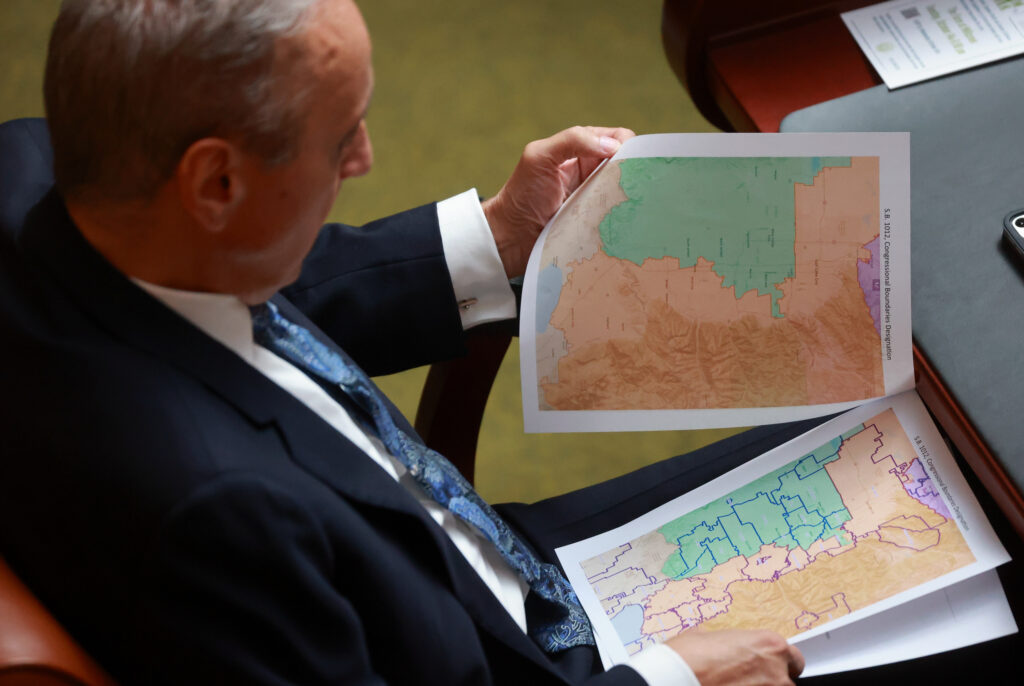Utah Judge Strikes Down GOP Gerrymander, Restores Voter-Approved Fair Map

In a sweeping victory for voters, a Utah court struck down the GOP-controlled legislature’s congressional gerrymander and a companion law designed to entrench partisan power — restoring a fair map for the 2026 elections.
Judge Dianna Gibson ruled Monday that both the legislature’s new map, known as Map C, and the accompanying law, SB 1011, violated Proposition 4, the voter-approved constitutional amendment banning partisan gerrymandering.
The decision ensures Utah’s 2026 congressional elections will proceed under a court-ordered fair map drawn according to the neutral criteria voters demanded.
Get updates straight to your inbox — for free
Join 350,000 readers who rely on our daily and weekly newsletters for the latest in voting, elections and democracy.
“In 2018, Utahns exercised their fundamental constitutional right to alter or reform their government via an initiative that, among other things, banned partisan gerrymandering,” Gibson wrote. “S.B. 1011 unconstitutionally impairs Proposition 4’s reforms in violation of Article I, Section 2 of the Utah Constitution.”
The court found that SB 1011 “effectively mandates the very partisan favoritism that Proposition 4 was enacted to stop,” using statistical tests that reward maps skewed toward the majority party.
“The evidence shows that the partisan bias test directly contravenes Proposition 4’s neutral redistricting criteria,” Gibson found. “It fails maps that perform best on those criteria and passes maps that perform worst on them.”
At the center of the case was Map C, a congressional plan pushed through by GOP lawmakers after the court’s earlier August order required new maps to comply with Proposition 4. Gibson rejected the legislature’s attempt to re-package gerrymandering as “science.”
“Map C does not comply with Utah law,” she added. “Map C creates four districts in which zero Democratic statewide candidates have prevailed under the assessed elections.”
The court also found that Map C was “an extreme partisan outlier — more Republican than over 99 percent of expected maps drawn without political considerations.” Expert simulations showed that neutral maps would consistently yield three Republican and one Democratic district, while Map C guaranteed a 4-0 Republican sweep.
To remedy the violation, Gibson adopted Plaintiffs’ Map 1, a plan submitted by the pro-voting plaintiffs finding it best met the state’s constitutional standards.
“The public has an interest in proceeding with a congressional map in the 2026 election that complies with Proposition 4, not one that undermines the core reforms,” she wrote. “The Court APPROVES Plaintiffs’ Map 1 as the judicial remedy and ORDERS that Map 1 be implemented for use in Utah’s congressional elections.”
Democratic lawmakers praised the decision.
“This is a win for every Utahn,” the state’s House and Senate Democrats said in a joint statement. “We took an oath to serve the people of Utah, and fair representation is the truest measure of that promise.”
The decision marks a monumental relief for Democratic voters in Utah, who for years have seen their voices cracked and packed across sprawling, rural districts engineered to dilute the state’s only Democratic stronghold. With this ruling, the court rebalanced the state’s map in a way that could finally make one congressional seat competitive — restoring real electoral choice to hundreds of thousands of Utahns.
And the implications stretch far beyond state lines.
The ruling arrives amid a wave of GOP gerrymanders that could determine control of the U.S. House. Across the country, Republican majorities in states like Texas, North Carolina and Missouri have pushed aggressive mid-decade redraws to cement power through 2030.
Utah’s decision, by contrast, affirms that state constitutions can still serve as a shield against gerrymandering — even in deeply red states.
For Democrats fighting to hold or flip seats nationwide, Gibson’s ruling delivers both a symbolic and strategic win.
“The voters of Utah won a complete and total victory to end gerrymandering in the state,” the League of Women Voters of Utah, one of the plaintiffs, said in a statement. “Redistricting is not a mere exercise in political line-drawing; it strikes at the very heart of our democracy.”
The GOP-led legislature is expected to appeal to the Utah Supreme Court, but barring a last-minute stay, Plaintiffs’ Map 1 will govern Utah’s 2026 congressional elections.